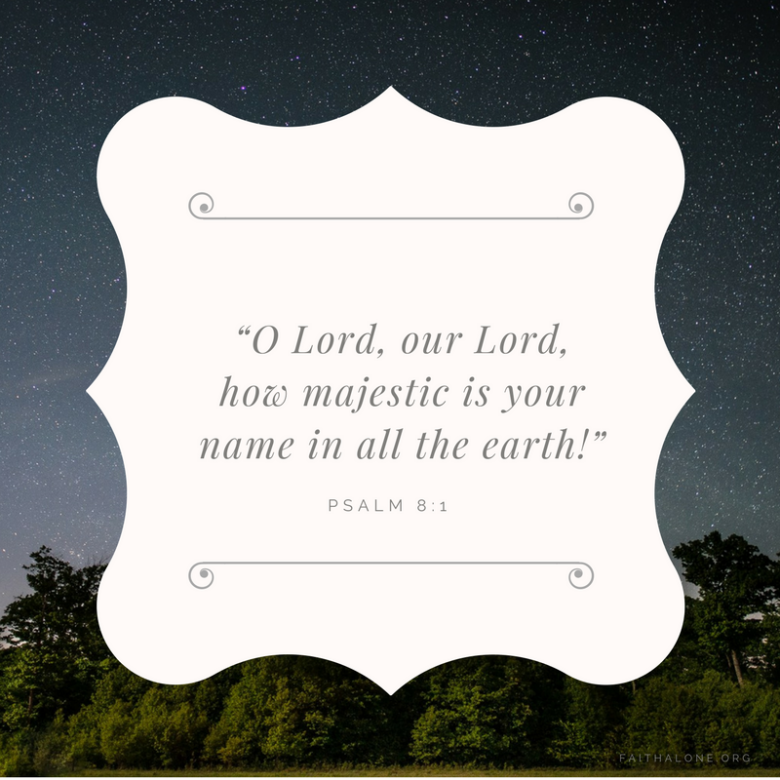I have a confession to make. Many times when I read the Psalms I get frustrated because I don’t know the background of a particular Psalm. Many times, I am not even sure who wrote it.
So, I love it when I read a Psalm and see that the New Testament quotes it. Whatever the background of that Psalm, I know what it means for the New Testament believer.
Psalm 8 is an example of what I am talking about. There are two direct quotes from this Psalm in the New Testament. Verse two of the Psalm says, “Out of the mouth of babes and nursing infants You have ordained strength.” Many will recognize that Jesus quoted this verse when He rode into Jerusalem on Palm Sunday. After Jesus rode into the city, He went into the Temple. While there He healed many who were sick and blind. The children present shouted, “Hosanna to the Son of David.” The Pharisees were upset that the children were proclaiming Jesus as the Son of David (Matt 21:16).
In the original Psalm, perhaps the author was also thinking that babes and infants reflect the image of God. In the context of Matthew, it is the words that the kids are saying that causes Jesus to quote the verse. Clearly, the main point is that even the most humble and least important people in the eyes of the world praise God. Many times they know things that older people and those wise in the world’s eyes do not know. In the example of Matthew 21, the Pharisees do not recognize who Jesus is and in, in fact, want the kids to be quiet. The Pharisees were the wise and educated of the day.
The Psalmist goes from the lowly, to the highest of heights. In verses 3-4 he says, “When I consider Your heavens, the work of Your fingers, the moon and the stars, which You have ordained, what is man that You are mindful of him,and the son of man that You visit him?” In other words, he says that creation itself proclaims the praise of God. All the celestial bodies do. When a person looks at creation, he is able to see that the Creator is all powerful and wise. Only such a Person could do the things that the Creator did.
The author of Hebrews quotes from these verses in Hebrews 2:6-8 (actually he quotes from Psalm 8:4-6). The point here is that man is placed over the creation of God. It is a creation that proclaims the greatness of God.
But for the author of Hebrews, the ultimate fulfillment of these verses is Jesus Christ. Man will fulfill the purpose of his creation in Christ. Men and women will rule over God’s eternal Kingdom because of what He did in the Incarnation.
What a beautiful Psalm. I am so glad that both Matthew and the author of Hebrews quote from it! The highest parts of creation, as well as the most lowly speaks of the greatness of God. Even though the Psalm speaks of the central and exalted role that mankind occupies in God’s creation, ultimately, all honor and praise goes to God. Even though man has been created a “little lower than the angels,” and has been “crowned with glory and honor,” and has “dominion over the works of” God’s hands, it is not man that is the emphasis of the Psalm. It is God. It is only in the God/Man that man will experience these honors.
We see in these verses how the Old Testament points to Christ. We are reminded that He is worthy of our worship and honor.
In this light, Psalm 8 is a great Psalm because it is the source of a very popular Christian song. The Psalm starts and ends with the statement, “O Lord, our Lord, how majestic is your name in all the earth!” Most of us are very familiar with the modern hymn of praise based upon this Psalm. I am sure some of you are singing the song now! How appropriate that the Psalm that speaks of Christ and how He not only came to give us eternal life, but also makes it possible for believers to rule in the world to come would begin and end with praise to Him. How appropriate as well that ultimately all will give Him the worship He is due.
I don’t feel any frustration reading this Psalm!


